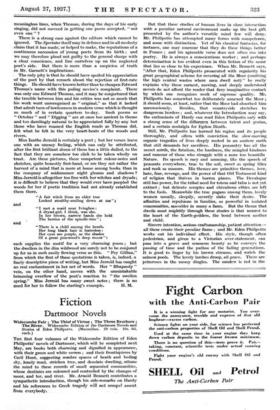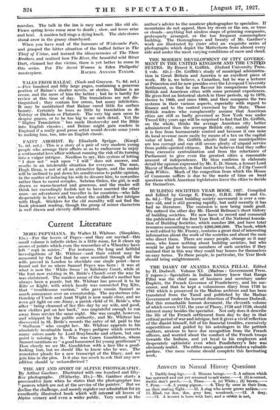Fiction
Dartmoor Novels
Widecombe Fair ; The Thief of Virtue ; The Three Brothers ; The River. Widecombe Edition of the Dartmoor Novels and Stories of Eden Phillpotts. (Macmillan. 20 vols. 10s. 6d. each.) THE first four volumes of the Widecombe Edition of Eden Phillpotts' novels of Dartmoor, which will be completed next May, are books both charming and dignified in appearance, with their green and white covers ; and their frontispieces by Cecil Hunt, suggesting sombre spaces of heath and boding sky, lonely road, stricken tree, and desolate dwelling, attune the mind to these records of small separated communities, whose destinies are coloured and controlled by the changes of moor, and tor, and river. Mr. Arnold Bennett contributes a sympathetic introduction, though his side-remarks on Hardy and his references to Greek tragedy will not compel assent from everybody. But that these studies of human lives in close interaction with a peculiar natural environment make up the best gift presented by the author's versatile mind few will deny. Mr. Phillpotts has attempted many forms with competence, and some with distinction. Yet of his classical fantasias, for instance, one may murmur that they do these things better in France ; and his agreeable verse does not often rise into poetry. He is always a conscientious worker ; and perhaps determination is too evident even in this fiction of the moor that lies so close to his experience. When Mr. Bennett says, "After that, Eden Phillpotts prosecuted with regularity his great geographical scheme for covering all the Moor (omitting the high central wastes where men dwell not) " he really explains why these earnest, moving, and deeply understood novels do not afford the reader that fiery imaginative contact by -which one recognizes work of supreme quality. Mr. Phillpotts has somewhat too deliberately annexed the Moor ; it should seem, at least, rather that the Moor had absorbed him unconsciously. Besides, that countryside stretches to dangerous borders ; and, whatever the Introduction may say, the enthusiasts of Hardy can read Eden Phillpotts only with a strong sense of the differer e.,..... between talent and genius, and a certain nostalgia for Egdon Heath.
Still, Mr. Phillpotts has learned his region and its people thoroughly, and offers with conviction the slow-moving organic tragedies of lives deeply rooted in an austere earth that still demands her sacrifices. His peasantry has all the secret mirth, the fatalism, the hardness, the mingled kindness and rancour of those who struggle with a none too bountifu Nature. Its speech is racy and amusing, like the speech of peasants everywhere, true to the soil, sweet as spring lilies and rank as manure. His themes are primitive themes, love, hate, fear, revenge, and the power of that Old Testament kind of religion that thrives in barren places. The Decalogue still has power, for the tribal need for totem and tabu is not yet extinct ; but delicate scruples and chivalrous ethics are left to the fools. Meanwhile the true pagans among them, lovely women usually, sleepily, secretly slake their desire. The affinities and repulsions in families, so powerful in isolated communities, smoulder in many a farm- But the theme that dwells most mightily through these stories is that nearest to the heart of the Earth-goddess, the bond between mother and child.
Sincere intention, serious craftsmanship, patient attention— all these create their peculiar flame ; and Mr. Eden Phillpotts works out his individual effect. His style, though often pedestrian, and given to a Victorian over-statement, can pass into a grave and sensuous beauty as he conveys the passing of time and the pathos of the fading generations. It is good to linger by his brown streams, and watch the salmon pools. The lovely larches droop, all grace. There are primroses in the mossy dingles. The sundew is red in the Marshes. The talk in the inn is racy and rare like old ale. Fierce spring•Inves come near to death ;, slow, sad loves arise • and heal. A maiden bell rings a dying knell. The slate stones • stand arow in the grassy churchyard.
When you have read of the humours of Widecombe Fair, and grasped the bitter situation of the baffled father in The Thief of Virtue, and learned the idiosyncrasies of The Three Brothers, and realized how The River, the beautiful wild River *-Dart, claimed her due victim, there is yet better to come in .this series. For The Secret Woman is Eden Phillpotts'



































 Previous page
Previous page